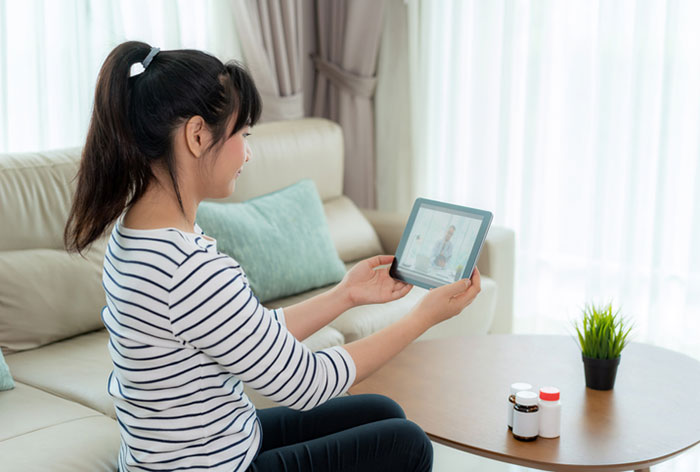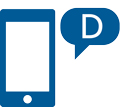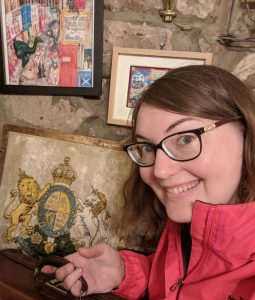Health questions and related online resources
Posted on May 7, 2020 at 6:00 am

By Corinne Wilson
DISCLAIMER: This blog containing health resources is not, nor is it intended as, a replacement or substitution for medical consultation with a healthcare professional.
If you are experiencing a medical emergency: Dial 911.
I was coming down with something right as the first COVID-19 cases appeared in Seattle. Fortunately, I knew exactly where I’d gotten it: a friend’s boyfriend. She told her boyfriend to stop complaining and being a “sad sack,” and that he was not too sick to go to the party.
Spoiler: He wasn’t fine. He and everyone at that party were sick in bed for a week afterward. (Oops.)
Most everyone else at the party recovered fairly quickly, but my cough hung on as all my other symptoms cleared up. A doctor diagnosed me with bronchitis and prescribed medication, but I found myself coming up with new questions.
Was my medication different than what my other friend with bronchitis was prescribed, or just a different brand name? How would I know if my bronchitis turned into pneumonia? When do I need to call the doctor again? What if I’m only 85% better when I’ve completed my prescription?… Is that normal?
By then, novel coronavirus panic was in full swing, and doctors’ offices were full up. So, I turned to two reliable online sources and the free nurses’ hotline (offered through my insurance) for my relatively minor questions. (You know that magnet with the nurses’ hotline number that they keep sending you in the mail? I suggest that you go find that and keep it handy.)
It isn’t too surprising that a lot of people experience similar situations to mine. We get medical questions at the library reference desk all the time.
Sometimes people ask librarians which foods contain a certain vitamin the doctor has recommended. Or they want to know details about something an aging parent was just diagnosed with. Or they want books about how parents can manage and deal with the behavioral disorder they just learned their child has.
Librarians are not medical professionals. That’s not our training. And we can’t diagnose anyone or give you an opinion on what that rash might be (and please, please don’t ask us).
What we know is information. We are trained to find reliable, accurate, factual information. There are many websites giving incorrect, misleading, or incomplete health and dietary information. Librarians can share reliable places online to look for information directly from medical organizations and professionals.
Our libraries are closed to the public right now under our governor’s mandate, and without us at the service desk to help you with your questions, I realize that good sources of information are more needed now than ever.
Here are a few online resources for health questions that you can rely on for accurate and reliable information.
Medline Plus
Website (English): https://medlineplus.gov/
Website (Spanish): https://medlineplus.gov/spanish/
Sponsored by U.S. National Library of Medicine
Feature: You can use the search feature to get printable information about medical topics.
From the home page, you can visit the following helpful areas of the website:
- Health Topics provides an alphabetized list of disorders and conditions. This is helpful if you are looking for information too obscure or hyper-specific to be in a general health book.
- Drugs, Herbs and Supplements provides an alphabetized list of prescription and over-the-counter (OTC) medication; their uses, side effects, dosage, and special precautions; and what to do if you forgot to take a dose. You will also find generic medicine names matched to brand names, sometimes as a full list of all the names the medicine is sold under.
- Video and Tools is a section of videos on how different conditions affect the body. You can also take quizzes on health issues.
- Medical Tests provides information about why a doctor might conduct a medical test, what the test is for, how it is administered, how long results may take, and what the results will indicate concerning health and medical diagnoses.
- Organizations arranged by topic shares a list of organizations that can give you more information about specific health issues and/or experts in those fields.
- Health Information in Multiple Languages offers more than just English and Spanish. You can find your home language listed in English as well as in the language itself.
Poison Pill ID
Website: https://pill-id.webpoisoncontrol.org/#/intro
Web Poison Control’s Pill Identifier website, sponsored by Poison Control Center
You can search medications by imprint code, shape and color, or their name.
This website helps you with questions like the following:
- What is this pill I found in my teen’s pocket?
- I mixed up my medications and don’t know which pill to take.
- I think I took too much or the wrong medicine.
- Was my prescription filled correctly? It looks different from before.
Consumer Product Information Database
Website: https://www.whatsinproducts.com/
You can click on a product for more information. For a printable information sheet, scroll to the blue “View Safety Data Sheet” button.
This website helps you with questions like the following:
- What’s in my household product or cleaner?
- Is this product environmentally friendly?
- Is this product dangerous or toxic?
- How do I use this product safely?
- How do I contact the product’s company for more information?
Tox Town
Environmental Health Concerns and Toxic Chemicals Where You Live, Work and Play
Website: https://toxtown.nlm.nih.gov/
Sponsored by U.S. National Library of Medicine
Herbs at a Glance
Website: https://nccih.nih.gov/health/herbsataglance.htm
Sponsored by U.S. National Library of Medicine
You’ll find brief fact sheets providing basic information about specific herbs or botanicals, including common names, scientific information, potential side effects, and cautions.
This website helps you with questions like the following:
- Is a botanical or herb causing mild side effects?
- What can I use this herb for?
- How do I use this herb or botanical safely?
- What are the benefits of using this herb or botanical?
Skinsight
Website: https://www.skinsight.com/
Find information about skin conditions, using age, gender, and location on the body. You can see photos of skin ailments to find the closest match.
This website helps you with questions like the following:
- What’s this weird rash I have?
- What caused this weird rash I have?
- How can I get relief for this itch or pain?
- Do I need to see a doctor or will it go away on its own?
Disposal of Unused Medicines: What You Should Know
Website: https://www.fda.gov/drugs/safe-disposal-medicines/disposal-unused-medicines-what-you-should-know
Sponsored by the Federal Drug Administration (FDA)
This website helps you with questions like the following:
- Can I flush this drug safely?
- Can I throw away this drug safely?
- Where can I turn in drugs and unused prescriptions that are not safe to flush?
- How do I dispose of syringes and needles?
Clinical Trials
Website: https://clinicaltrials.gov/
Sponsored by U.S. National Library of Medicine
You can search this website for actively recruiting studies that you may be able to participate in and to learn about new interventions and treatments that are being considered.

Pronunciator
Website: https://www.scld.org/pronunciator
If you need to communicate with someone in a different language than your native language about COVID-19, then our language learning resource, Pronunciator, has a COVID-19 vocabulary course in 101 languages with terms related to the virus.
How to find the COVID-19 Essential Phrases course:
- To launch the Pronunciator app, you can use your already created account to “Log In” or “Register” with your email to track your courses and learning or choose “Instant Access” to see the content without saving your learning courses.
- Once the Pronunciator app has launched, select your home language and the language in which you’d like to learn the COVID-19 vocabulary.
- Select “Learning Guides and More” to find the COVID-19 Essential Phrases course.
Are you interested in saving a bookmark as a general resource for later? Many of the tools and websites mentioned above can be found in one place. Bookmark this webpage for your quick reference: https://www.nlm.nih.gov/portals/public.html.

Corinne Wilson is a community librarian at North Spokane Library with a focus on planning programs and events. As a librarian, she has retrieved birthday party balloons from the ceiling, formed movie monsters out of clay, played a disgruntled NASA tech support employee in an escape room, attached a paper mache Death Star to the ceiling, toured nuclear reactors, and smashed many boiled eggs. She enjoys eating lunch.
Tags: adults, FDA, health, NIH, prescriptions, pronunciator, resources, symptoms
